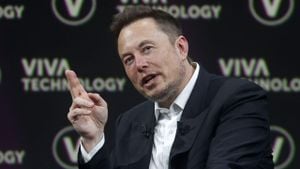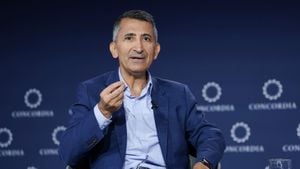President-elect Donald Trump has made waves once again by nominating Dr. Jay Bhattacharya to lead the National Institutes of Health (NIH), America's premier medical research institution. Bhattacharya, a professor at Stanford University, is widely known for his controversial views on pandemic responses, particularly his criticism of lockdowns and vaccine mandates. The announcement, made late Tuesday, sets the stage for what could be pivotal changes at the NIH if Bhattacharya's vision is realized.
"Together, Jay and RFK Jr. will restore the NIH to a Gold Standard of Medical Research as they examine the underlying causes of, and solutions to, America’s biggest Health challenges, including our Crisis of Chronic Illness and Disease," Trump stated. The mention of RFK Jr. refers to Robert F. Kennedy Jr., who Trump has suggested might head the Department of Health and Human Services.
Bhattacharya’s stance on public health is clear. He was one of the co-authors of the Great Barrington Declaration, released back in October 2020. This document argued against prolonged lockdowns, asserting they were causing more harm than good to the public. Bhattacharya had publicly declared, "I think the lockdowns were the single biggest public health mistake," during remarks made back in March 2021.
The crowning moment for Bhattacharya’s academic career came with this paper; it suggested allowing younger and healthier individuals to return to normal activities, which would, according to him, help establish herd immunity more efficiently. His views, especially on keeping the economy afloat, have drawn support from certain factions but have also met significant criticism from the broader scientific community.
During the pandemic, Bhattacharya also took aim at COVID-19 vaccine mandates. He argued they were counterproductive, limiting the freedoms of unvaccinated individuals and, strangely enough, exacerbated distrust among the public toward health authorities. Critics argue his positions could undermine efforts made to promote vaccinations which are still seen as effective tools against COVID-19.
Joining Bhattacharya at the NIH will be Jim O’Neill, nominated as deputy secretary. O’Neill previously held roles within the Department of Health and Human Services and has experience running aspects of the notoriously vast health bureaucracy. Trump's announcement mentioned O’Neill would work on enhancing management, transparency, and accountability within the agency, echoing his administration's aim to "Make America Healthy Again." The NIH itself operates with an annual budget of approximately $48 billion, employing thousands of researchers and managing extensive grants for external studies on various health issues ranging from cancer to infectious diseases.
While the turmoil surrounding pandemic measures continues, the selection of Bhattacharya has placed the NIH and its future direction under the spotlight. The agency, which carries out its own scientific research alongside funding external projects, must now navigate a new leadership perspective, one often at odds with conventional public health responses seen during the COVID-19 crisis.
For many outside the Trump administration, the nomination sparks questions about the future integrity of science-based research within the NIH. Figures from the previous administration, including Dr. Francis Collins, the former NIH director, sharply opposed the principles outlined in the Great Barrington Declaration, advocating instead for strict health measures and the widespread adoption of vaccinations.
This latest nomination by Trump to fill significant health agency positions with individuals who have expressed skepticism about entrenched public health protocols has already set off alarm bells among certain health experts. They worry about the potential shift away from evidence-based guidelines toward more politically motivated or alternative health strategies.
Even as Bhattacharya prepares to step up to lead the nation's medical research efforts, the NIH stands at a crossroads. Will it stay true to the scientific principles many health professionals advocate for, or will the new leadership usher in an era of transformative, albeit contentious, change? Only time will tell, but the appointment definitely promises to keep everyone watching closely, and perhaps lead to heated discussions on pivotal public health directions moving forward.



